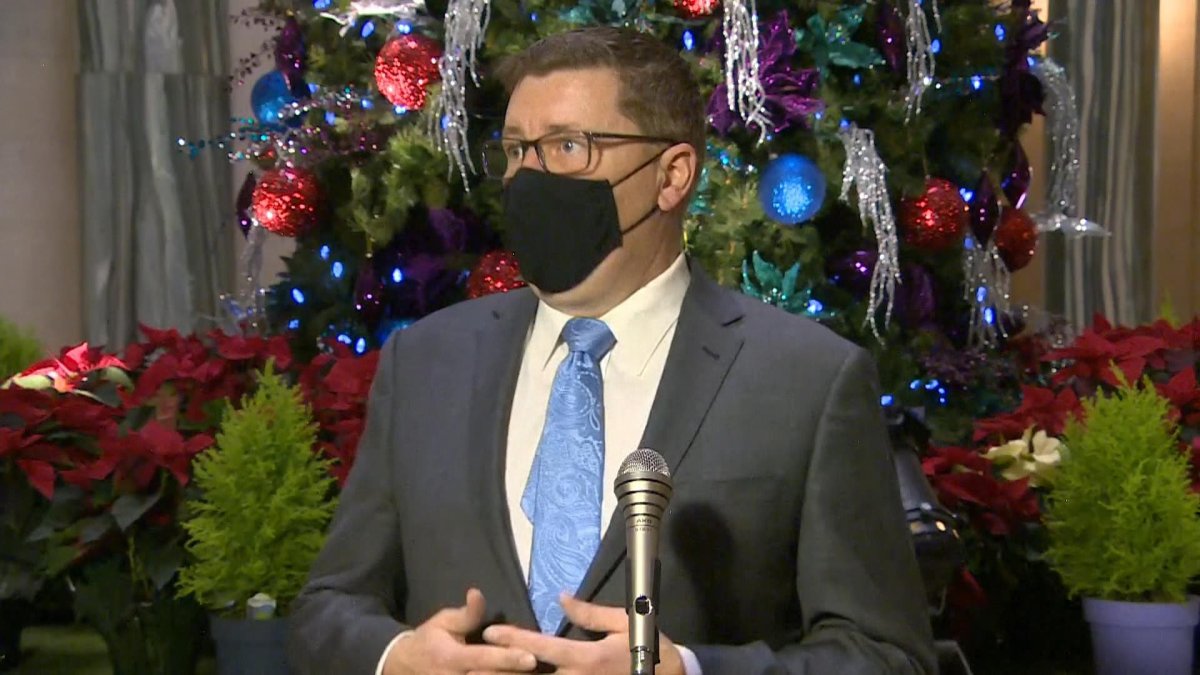UPDATE: Due to a power outage in Regina, the provincial government said it’s postponing the release of Saskatchewan’s vaccine delivery plan, which was expected on Tuesday, Dec. 8, until 10 a.m. on Wednesday, Dec. 9.

The province’s coronavirus vaccine distribution plan is coming Tuesday, Dec. 8, and will have phases, according to Saskatchewan Premier Scott Moe.
He added the Saskatchewan Health Authority (SHA) and the province’s chief medical health officer, Dr. Saqib Shahab, have been working a “robust” vaccination plan, building off of the H1N1 plan and annual flu vaccines.
“We have a phased-in approach of which we’ll go into detail tomorrow, where phase one will be focusing on vaccinating, obviously health-care workers, as well as those that are vulnerable in our society, long-term care residents, for example, and moving into when we have the increased number of vaccines into a mass vaccination on a prioritization level,” Moe told reporters on Monday.
“But we have been in contact with the federal government. We expect to be receiving vaccines this month. And the people of this province can rest assured that every vaccine that we receive from the federal government, we will turn around and have it available to Saskatchewan people as soon as possible.”
“This is the finish line. It is going to be a staggered finish line, for sure, but this is the finish line to a very serious pandemic that we have fought so hard, each of us, as individuals across this province, to keep at bay. This is the finish line on when we can ultimately start to think about going back to life as we used to know it,” Moe said.
- Premier Moe responds to Trudeau’s ‘good luck with that’ comment
- Drumheller hoping to break record for ‘largest gathering of people dressed as dinosaurs’
- As Canada’s tax deadline nears, what happens if you don’t file your return?
- Posters promoting ‘Steal From Loblaws Day’ are circulating. How did we get here?
Health officials said there were 274 new cases in the daily update on Monday, with the overall total for the province growing to 10,412 since the first case was reported in March. They added the new seven-day average of daily cases is 264.
The premier commented on the phased aspect of the forthcoming plan.
“We’re also hopeful that there will be additional companies that will have their vaccines approved and we’ll be able to actually build on those numbers through even the first few months of 2021. This is why we have our phases,” Moe said.
“Phase one, which is our very targeted phase of looking at how do we get these vaccines to those that are immunocompromised or elderly in long-term care homes or health-care workers, for example, versus phase two, which starts to look at some more larger mass vaccinations out in our communities. We don’t have a date on when those phases would occur. Those phases will occur when we have enough vaccines to satisfy phase one.
“It would be nice to have more information on when and how much and how many of these vaccines we’re going to receive at what point in time. We don’t have that information. The information that we do have is that we are going to receive 180,000 vaccines, given those first two applications would be approved. That’s the concrete information we have.”
Moe said there will be details released Tuesday about where the vaccines will located and how quickly it can be administered upon arrival.
“There will be some regional variances on which vaccines go where, just due to some of the nuances of the different vaccines, whether it’s one versus two-dose, what temperature and facilities we need to store those. So there’s a lot of efforts and it’s a very intricate program that is coming together,” Moe said.
“Tomorrow, they’ll go through the actual logistics of how the vaccine is actually arriving here … where those sites are and … some of the parameters around accessing some of those very early vaccines in the way of location and how far those vaccines can actually move.
“This robust vaccine deployment plan that we have that will ultimately help us find our way through what has been a very troublesome eight, nine months.”
In the province, 143 people are currently in hospital with COVID-19 — 117 are receiving inpatient care and 25 are in intensive care. This is the most hospitalization to date.
There have been 60 COVID-19-related deaths in Saskatchewan.

Questions about COVID-19? Here are some things you need to know:
Symptoms can include fever, cough and difficulty breathing — very similar to a cold or flu. Some people can develop a more severe illness. People most at risk of this include older adults and people with severe chronic medical conditions like heart, lung or kidney disease. If you develop symptoms, contact public health authorities.
To prevent the virus from spreading, experts recommend frequent handwashing and coughing into your sleeve. They also recommend minimizing contact with others, staying home as much as possible and maintaining a distance of two metres from other people if you go out. In situations where you can’t keep a safe distance from others, public health officials recommend the use of a non-medical face mask or covering to prevent spreading the respiratory droplets that can carry the virus. In some provinces and municipalities across the country, masks or face coverings are now mandatory in indoor public spaces.
For full COVID-19 coverage from Global News, click here.



Comments